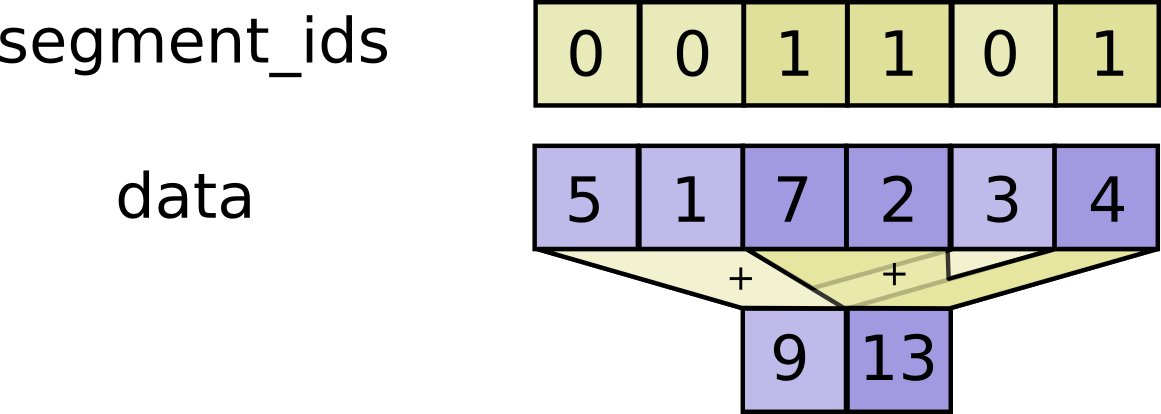Computes the sum along segments of a tensor.
Read [the section on segmentation](https://tensorflow.org/api_docs/python/tf/math#Segmentation) for an explanation of segments.
Computes a tensor such that \\(output[i] = \sum_{j...} data[j...]\\) where the sum is over tuples `j...` such that `segment_ids[j...] == i`. Unlike `SegmentSum`, `segment_ids` need not be sorted and need not cover all values in the full range of valid values.
If the sum is empty for a given segment ID `i`, `output[i] = 0`. If the given segment ID `i` is negative, the value is dropped and will not be added to the sum of the segment.
`num_segments` should equal the number of distinct segment IDs.

c = tf.constant([[1,2,3,4], [5,6,7,8], [4,3,2,1]])
tf.unsorted_segment_sum(c, tf.constant([0, 1, 0]), num_segments=2)
# ==> [[ 5, 5, 5, 5],
# [5, 6, 7, 8]]
Constants
| String | OP_NAME | The name of this op, as known by TensorFlow core engine |
Public Methods
| Output<T> |
asOutput()
Returns the symbolic handle of the tensor.
|
| static <T extends TType> UnsortedSegmentSum<T> | |
| Output<T> |
output()
Has same shape as data, except for the first `segment_ids.rank`
dimensions, which are replaced with a single dimension which has size
`num_segments`.
|
Inherited Methods
Constants
public static final String OP_NAME
The name of this op, as known by TensorFlow core engine
Public Methods
public Output<T> asOutput ()
Returns the symbolic handle of the tensor.
Inputs to TensorFlow operations are outputs of another TensorFlow operation. This method is used to obtain a symbolic handle that represents the computation of the input.
public static UnsortedSegmentSum<T> create (Scope scope, Operand<T> data, Operand<? extends TNumber> segmentIds, Operand<? extends TNumber> numSegments)
Factory method to create a class wrapping a new UnsortedSegmentSum operation.
Parameters
| scope | current scope |
|---|---|
| segmentIds | A tensor whose shape is a prefix of `data.shape`. |
Returns
- a new instance of UnsortedSegmentSum
public Output<T> output ()
Has same shape as data, except for the first `segment_ids.rank` dimensions, which are replaced with a single dimension which has size `num_segments`.
